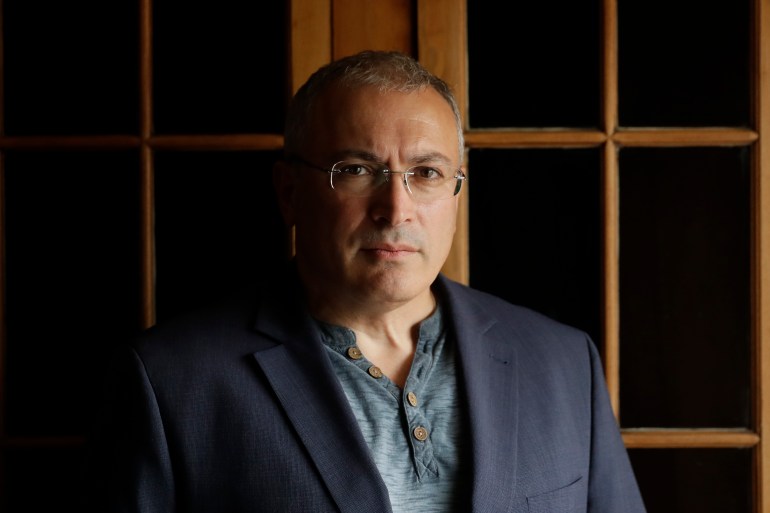Mikhail Khodorkovsky, a former Russian oil tycoon, called for sanctions against Belneftekhim, Belarus’s state oil company, and Belaruskali, one of the world’s largest producers of potash.

Russian opposition figure Mikhail Khodorkovsky, the former owner of the Yukos Oil Company, spoke out about the arrest of journalist Roman Protasevich [File: Matt Dunham/AP Photo]
24 May 2021
Mikhail Khodorkovsky, a former oil tycoon who fell foul of Vladimir Putin’s Kremlin, said European countries should punish Belarusian President Alexander Lukashenko for his act of airspace “piracy” by sanctioning oil and potash producers.
“Roman Protasevich must be freed and the dictator punished,” Khodorkovsky said in a statement to Reuters news agency. “The dictator should be hit where it hurts the most: his wallet.”
“European countries should join United States sanctions against Belneftekhim and sanction Belaruskali,” Khodorkovsky said.
Belneftekhim is Belarus’s state oil company. Belaruskali is one of the world’s largest producers of potash fertilisers.
European leaders threatened on Monday to limit international air traffic over Belarus and possibly restrict its ground transport after a Ryanair passenger plane was forced to land in an incident denounced by Western countries as “state piracy”.
The presidential press service said Lukashenko personally ordered a MiG-29 fighter jet to accompany the Ryanair plane, which was en route from Athens, Greece to Vilnius, Lithuania, to the Minsk airport, where Protasevich – a journalist and passenger on the Ryanair flight – was arrested at the airport.
Protasevich, 26, is a co-founder of the Telegram messaging app’s Nexta channel, which Belarus last year declared as “extremist” after it was used to help organise large protests against Lukashenko.
Protasevich, who had fled the country for Poland, faces charges that could carry a prison sentence of up to 15 years.
Khodorkovsky condemned the diversion of the plane and the arrest of Protasevich.
“The piratical interception of a civilian aircraft in the Belarusian sky contemptuously disregards international aviation safety rules and is an unprecedented case of using military planes to hunt down a journalist,” Khodorkovsky said.
The incident also drew immediate international condemnation, calls for the activist’s release from the US and other nations, sanctions and an investigation by the United Nations’ civil aviation body.
EU sanctions expected to hit Belarus's potash, oil and finance

EU leaders summit in Brussels
Victoria Waldersee
Thu., May 27, 2021,
LISBON (Reuters) -The European Union will look at hitting Belarus's big potash exports as well as its oil and financial sectors with new sanctions, as punishment for forcing down a Ryanair flight to arrest a journalist, foreign ministers from the bloc said.
European leaders have described Sunday's incident, in which a flight between EU members Greece and Lithuania was pressed to land in Minsk and a 26-year-old exiled dissident and 23-year-old student were arrested, as state piracy. They have promised to impose serious consequences.
Foreign ministers gathering in the Portuguese capital Lisbon on Thursday said they were looking at hitting sectors that play a central role in the Belarus economy, to inflict real punishment on President Alexander Lukashenko.
"The hijacking of the plane and the detention of the two passengers is completely unacceptable, and we will start discussing implementation of the sectorial and economic sanctions," EU foreign policy chief Josep Borrell told reporters before the informal meeting in Lisbon.
Luxembourg's Foreign Minister Jean Asselborn said: "The keyword, I think, is potash. We know that Belarus produces very much potash, it is one of the biggest suppliers globally, and I think it would hurt Lukashenko very much if we managed something in this area."
Lithuanian Foreign Minister Gabrielius Landsbergis said the EU should consider hitting the oil sector, while Germany's Heiko Maas spoke of measures to target financial transactions, which diplomats said would probably involve preventing the EU from lending to Belarusian banks.
Exports of potash - a potassium-rich salt used in fertilizer - are one of the major sources of foreign currency for Belarus, and state firm Belaruskali says it produces 20 percent of the world's supply.
The EU statistics agency said the bloc imported 1.2 billion euros ($1.5 billion) worth of chemicals including potash from Belarus last year, as well as more than 1 billion euros worth of crude oil and related products such as fuel and lubricants.
So far this week, Europe has already moved to bar its airlines from using Belarus air space and to keep Belarusian planes out of its skies. But finding a package of sanctions that would change the behaviour of Lukashenko has proven difficult.
Since cracking down on pro-democracy protests last year, he largely ignored three previous rounds of EU sanctions and comparable U.S. measures, mainly blacklists that bar officials from travelling to or doing business in Europe and the United States.
Ministers in Lisbon said new sanctions would include a fourth round of travel bans and asset freezes. They are aiming for agreement on June 21 when they meet in Luxembourg.
Western countries are demanding free elections in Belarus. Germany's Maas said sanctions should continue to be tightened, at least until more than 400 political prisoners there are released.
"As long as this is not the case, the EU cannot relent in paving the way for fresh sanctions," he said.
($1 = 0.8201 euros)
(Reporting by Victoria Waldersee in Lisbon and Sabine Siebold in BerlinWriting by Robin EmmottEditing by Hugh Lawson and Peter Graff)
No comments:
Post a Comment